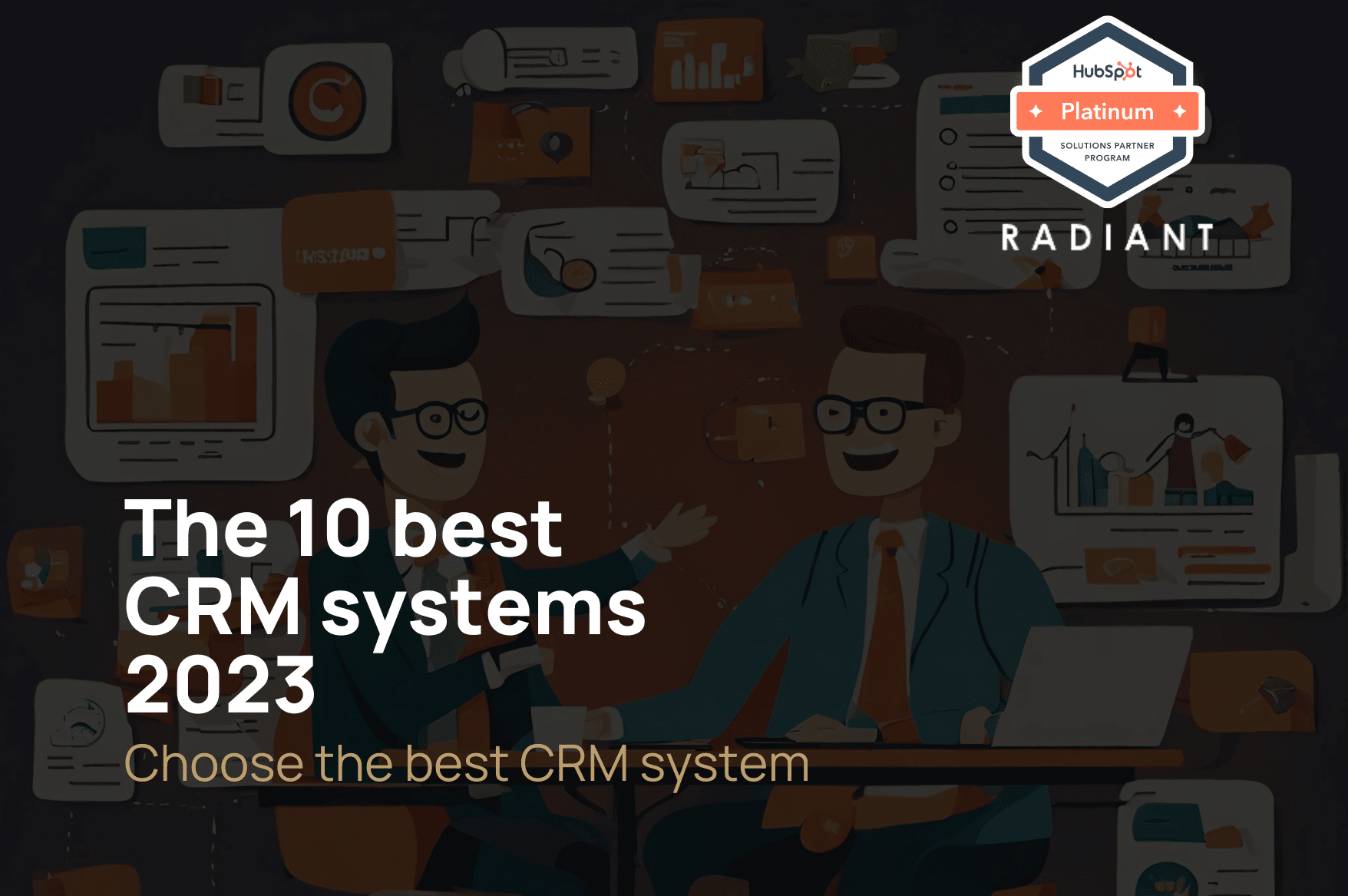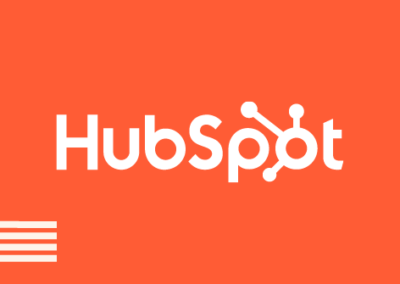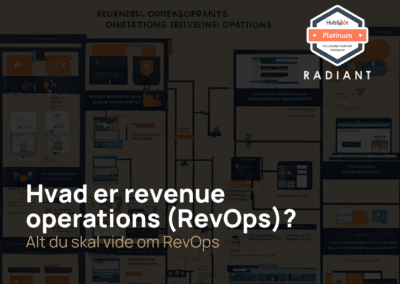Are you a business owner, CEO, sales director or marketing director looking for the best b2b CRM for your business? Then you’ve come to the right place. We have carefully selected and researched the market to present you with the leading CRM systems that can help you streamline your sales and marketing processes.
What is a CRM solution?
A CRM (Customer Relationship Management) solution is a software tool that helps companies manage and improve their customer relationships. It allows organizations to collect, research and organize important customer information in one place, such as contact details, purchase history and communications.
By implementing an effective CRM solution, your business can enjoy many benefits. It can increase the productivity of sales and marketing teams by automating workflows and customer relationship management. Furthermore, it can also contribute to better customer experiences through personalized communication and targeted marketing.
A typical CRM system has several basic functions, which include contact management, sales management, reporting and analytics, and task management. In addition, many advanced systems also offer features such as lead scoring, email marketing automation and integrated social media tools for even greater functionality.
Read also: What is CRM?
What features does a CRM solution include?
A CRM solution includes various features that help manage contacts, track the sales funnel and automate marketing.
Among these features are:
- Customer information
- Interaction history
- Sales management
- Marketing automation
- Reporting and analytics
Customer information
A CRM system allows you to store detailed information about customers, including name, address, phone number, purchase history and interactions with the company. It allows companies to organize and update customer data in a structured way.
Interaction history
The system records all interactions with the customer, such as emails, phone calls, meetings and service requests, providing a complete overview of the customer journey, attribution and analytics.
Sales management
CRM systems help manage the sales process from lead generation to closing the sale and provide the sales team with tools to track prospects and opportunities.
Marketing automation
Many CRM systems include tools for marketing automation, such as email campaigns, lead scoring and segmentation. Marketing automation enables marketing campaigns to be planned and executed efficiently using automated processes, making it easier to target and personalize marketing efforts.
Reporting and analytics
CRM systems often offer advanced reporting tools that provide insights into sales activities, customer satisfaction and other key performance indicators, helping businesses make informed decisions based on data and numbers rather than gut feelings.
Top 10 best CRM systems 2024
1. HubSpot CRM
HubSpot CRM is one of the best CRM solutions on the market in 2024. It offers a comprehensive suite of features for contact management, sales management and marketing automation. HubSpot CRM is known for its ease of use and also offers integrated social media and email marketing tools.
2. Salesforce
Salesforce is one of the most popular CRM solutions in the world. It offers a wide range of features including contact management, sales management and reporting. Salesforce is known for its scalability and can be customized to suit your business needs.
3. Microsoft Dynamics 365
Microsoft Dynamics 365 is a comprehensive CRM solution that integrates with Microsoft’s ecosystem of productivity tools. It offers advanced features like lead scoring, email marketing automation and AI-powered sales forecasting.
4. SAP Sales Cloud
SAP Sales Cloud is part of SAP’s C/4HANA suite. It combines sales automation with predictive analytics and machine learning to help sales teams improve their efficiency and predict customer behavior.
5. Zoho CRM
Zoho CRM is an affordable CRM solution that offers a wide range of features for contact management, sales management and marketing automation. Zoho CRM is known for its ease of use and its many customization options.
6. Oracle CX Sale
Oracle CX Sale is part of Oracle’s Customer Experience (CX) suite. Oracle CX Sales offers advanced sales automation tools, artificial intelligence-driven insights and robust reporting capabilities, making it a popular choice for larger businesses.
7. Insightly
Insightly is a popular CRM and project management tool designed specifically for small and medium-sized businesses. It helps organize contacts, sales, projects and tasks in one place. With an easy-to-use interface and strong integration capabilities with other popular business tools, Insightly makes it easy for teams to improve customer engagement and collaboration internally.
8. Freshworks
Freshworks CRM combines sales and marketing capabilities with artificial intelligence to give businesses a 360-degree view of their customers. It is known for its ease of use and scalability.
9. Pipedrive
Designed with sales teams in mind, Pipedrive focuses on making the sales process as simple and user-friendly as possible. With an intuitive drag-and-drop interface, it helps teams manage leads and opportunities effectively.
10. Bitrix24
Bitrix24 is a versatile business platform that combines CRM, project management, collaboration tools and communication features. It helps businesses manage customer interactions, sales opportunities and billing, while offering automated workflows and email marketing. With both cloud-based and on-premise options, Bitrix24 is designed to meet the needs of businesses of all sizes.
These CRM systems have been recognized as some of the best on the market in 2024. They offer a wide range of features and are known for their reliability and ease of use. Whether you need a CRM system to organize your contacts, manage the sales process or automate your marketing campaigns, there’s definitely a CRM solution on this list that will fit your needs.
Take a look at our comparison of CRM systems here.
How to choose the best CRM system for small businesses
An effective CRM system can strengthen your sales process on many levels, but which one is right for your business? At some point, it’s no longer possible to have a complete overview of your potential and existing customers in spreadsheets and documents. But you still need to make sure that sales are working with the right leads at the right time.
That’s why you need a great CRM system.
There are a lot of options out there, and it takes a lot of thought and research to choose the right one for you. Because with the right CRM system, you can:
- Get an overview of all interactions with potential and existing customers
- Integrate and target your sales and marketing activities
- Build and strengthen relationships with existing customers
- Improve collaboration between sales and marketing
- Generate and nurture leads to become customers
Here at Radiant, we have a clear favourite when it comes to CRM systems. But before we tell you which one, here’s a list of 3 things you should consider before choosing your CRM system.
3 tips when choosing a CRM system
We’ve listed our top 3 tips to consider when choosing your new CRM system. Then we’ll give you our absolute favorite and tell you why it could be the right solution for your business too.
- Know your needs – now and in the future
The needs you have today won’t necessarily be the same in 2 years. That’s why your new CRM system should be able to adapt to what you need. It should be flexible and scalable so that it grows with you.It’s also worth considering whether all employees need all features, or if different departments need different features.
- Integrated with your marketing efforts
The purpose of a CRM system is to streamline your sales and marketing efforts. Therefore, you need to make sure these features are included, or at least possible to integrate. If this is not possible, the system will be difficult to use. And if it’s difficult, it doesn’t get done. The CRM system should be able to integrate with all aspects of your marketing, from your website to social media, paid advertising, email and calls, and your CRM system should also be able to integrate with the rest of your business. This could be Office 365, ERP system and finance or HR software.
- Employee support and training
No matter which CRM system you choose and how good it is, you won’t see its full potential without a world-class implementation. And perhaps most importantly, this includes training your employees on the new system so they can take full advantage of all features.You should consider the support options that come with the CRM system. You might even consider getting assistance from a certified partner to define and implement, as well as train employees on the system and new processes.
Get the best CRM system with HubSpot
With HubSpot, you get the best CRM system for your business. At Radiant, we have tested many different CRM systems and have come to the conclusion that HubSpot is the leading CRM system.
HubSpot provides the best features to help organize and optimize the sales and marketing processes in your business. From lead generation to customer service, HubSpot gives you the tools you need to increase productivity and improve customer experience.
With an intuitive user interface (design) and advanced reporting options, HubSpot is the ideal choice for business owners, CEOs, sales directors, marketing directors and other decision-makers looking for an effective CRM solution.
When is HubSpot the right CRM for you?
#1 – B2B companies with a complex product or service
The more a potential customer needs to know before they decide to buy, the more you need content to guide that lead through the buying journey. Content can inspire and educate potential customer and answer any questions they may have. This type of marketing is also known as Inbound Marketing or Content Marketing, and it’s exactly what HubSpot excels at. And B2B companies doing inbound marketing with great content are the perfect match for HubSpot, both in terms of Marketing Hub and CRM.
#2 – B2B companies with a hybrid of transactional and relational sales processes
Complex products and services often come with long sales processes. For many businesses, this process can stretch over several months, and during that time, plenty of resources are required to nurture relationships with each individual. The right information, given at the right time, is crucial to closing a deal, and this is where HubSpot shines. HubSpot is not only a CRM system, but also a powerful platform for marketing automation. It allows you to create automated email campaigns and content workflows to ensure your potential customers get exactly the information they need, when they need it, to make the right decision and become a customer.
#3 – B2B companies with a narrow target audience
Businesses that work with a very narrow target audience can often benefit from HubSpot as it works well with well-defined segments. You can segment your target audience in a myriad of different ways, and HubSpot will help you personalize messages, create workflows and call-to-actions and much more. This way, you not only target your content to your audience but also improve their experience. On top of that, you also track the behaviour of your potential customers, so you know exactly when to reach out and start a conversation.
Get a free introduction to HubSpot
Streamline your sales and marketing processes with Radiant
CRM (Customer Relationship Management) systems play a crucial role in modern businesses. A CRM solution helps increase efficiency, optimize the sales process and improve customer satisfaction. By choosing the right CRM system, business owners, CEOs and other decision-makers can achieve greater efficiency, data-driven decisions and a more streamlined business.
There are a lot of CRM solutions out there, from HubSpot to SalesForce to Zoho, but at Radiant, we’ve found that the best solution is HubSpot. HubSpot is an easy-to-use CRM and a scalable solution that covers all aspects of your business.
If you choose HubSpot, it is relevant to seek out a HubSpot Partner (such as Radiant) as they can help with price negotiation, identifying which hubs you should choose and implementing HubSpot.
At Radiant, we can help optimize and implement your HubSpot, just like we’ve done for more than 100 companies. We have done this through HubSpot as a Service and Sales as a Service.
With HubSpot as a Service, you get a CRM solution that ties all your marketing, sales, customer service and CMS investments together. This way, you can ensure that you always have easy access to the right data and the latest tools to streamline your sales and marketing processes.




